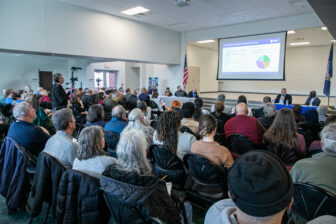For Immediate Release
January 14, 2013
Contact:
Diana Dascalu-Joffe, (240) 396-1984, diana@chesapeakeclimate.org
MDE Lauded for Legal Action to Stop Ground and Surface Water Contamination and Prevent Additional Pollution at Coal Ash Sites; GenOn to pay a civil penalty of $1.9 million
BALTIMORE—In a victory for Maryland communities and waterways, the Maryland Department of the Environment (MDE) filed a consent decree in federal court requiring utility company GenOn to clean up widespread ground and surface water pollution at three of its coal ash disposal sites. MDE and environmental groups have accused GenOn of illegally discharging toxic pollution into groundwater and local waterways at the Faulkner Landfill in Charles County, Brandywine Landfill in Prince Georges County, and the Westland Landfill in Montgomery County.
The consent decree is the result of an MDE enforcement prompted by a notice of intent to sue letter for violations of the Clean Water Act at the Brandywine Landfill filed by the Environmental Integrity Project and the University of Maryland Environmental Law Clinic on behalf of Defenders of Wildlife, Chesapeake Climate Action Network, Patuxent River Keeper, and Sierra Club. The settlement is available here: http://environmentalintegrity.org/news_reports/documents/2013_01_02_71-1_ConsentDecree.pdf
The consent decree requires GenOn Mid Atlantic to pay a civil penalty of $1.9 million to MDE and clean up existing contamination of ground and surface water. GenOn must also use the best technology available to clean up discharges from the site and take other remedial actions to prevent further contamination. Additionally, it will be required to evaluate whether nearby drinking water wells have been impacted by pollution at the sites and, if so, take action to clean up contamination.
GenOn must also submit a plan to control fugitive coal dust that can fly off the sites and lodge in people’s lungs causing respiratory illness.
Environmental Integrity Project Attorney Jennifer Peterson said: “We are pleased to see the Maryland Department of the Environment hold GenOn accountable for compliance with laws that are already on the books to protect communities and the environment from unsafe disposal of coal ash. The GenOn landfills, and hundreds of other coal ash dumps across the country, are poisoning our creeks, rivers, and groundwater. MDE’s action sends a strong message that the owners and operators of these dumps are not above the law.”
University of Maryland Environmental Law Clinic Staff Attorney Andrew Keir said: “This settlement agreement shows the importance of the citizen suit provision of the Clean Water Act. The citizen intervenors sent the notice of intent to sue letter that caused MDE to file this litigation and consulted with MDE throughout the settlement negotiations to strengthen the agreement and better protect the environment.”
“This consent decree illustrates the important role that citizen vigilance plays in helping the government do its job to protect the public against corporate environmental polluters,” said Fred Tutman, Patuxent Riverkeeper. “This is just one of many much needed steps toward holding coal burning interests accountable for the known risks and consequences to communities located near their waste disposal facilities. There are more of these sites out there across our state. Engaged, informed, outspoken and vigilant citizens create a better environment for themselves and their neighbors.”
The Chesapeake Climate Action Network’s Diana Dascalu-Joffe, Senior General Counsel said, “This settlement is a victory for the citizens living near these three GenOn coal ash landfills in Maryland. For years, residents have been living in the shadow of the coal industry’s “dirty little secret”, fearing the impacts that these aging, unlined and largely unregulated coal ash landfills are having on their local waterways, community and environment. We applaud MDE on this aggressive settlement agreement that is the first step to help clean up these sites and ensure that they don’t pollute the environment in the future. We are also proud of the part that CCAN and our partners have played in getting this historic agreement across the finish line.”
“Coal ash dumps and the toxic pollution they release pose a significant threat to our nation’s aquatic biodiversity. This settlement will help protect Maryland’s fish and wildlife and hopefully send a strong message to other coal ash dump operators across the nation that they too need to clean up their operations,” said Michael Senatore, Vice President of Conservation Law for Defenders of Wildlife.
“This is yet another example of the reckless behavior by the coal industry that puts our kids and communities at risk. We applaud MDE’s action to make GenOn clean up these hazardous sites and hope they will similarly hold them accountable to the strongest public health safeguards for any new waste streams they choose to take on in these communities,” said Kim Teplitzky, a spokeswoman for the Sierra Club.
The groups intend to file a statement with the court supporting the settlement, but will ask the court to strengthen the consent decree by requiring GenOn to comply with minimum safeguards if it wants to dispose of coal ash in new disposal cells at the Landfills.
Background on three coal ash sites
The Brandywine Landfill contains more than 5.5 million cubic yards of coal ash. Monitoring conducted by GenOn (and the former owner of the site) and MDE show that concentrations of cadmium and selenium in discharges from the site have exceeded water quality standards. MDE has also determined that toxic pollutants like cadmium, manganese, sulfate, iron, total dissolved solids, aluminum, and chloride have leached from the landfill into groundwater at levels above primary and secondary drinking water standards. The coal ash dumped at this site is generated by the GenOn Chalk Point power plant.
The Faulkner Landfill contains more than 5.5 million cubic yards of coal ash. Monitoring conducted by GenOn (and the former owner of the site) show that discharges of cadmium, copper, lead, and selenium exceed water quality standards. Additionally, MDE has determined that cadmium, aluminum, iron, manganese, chlorides, and total dissolved solids is present in groundwater monitoring wells at levels that exceed primary and secondary drinking water standards. The coal ash dumped at this site was generated by the GenOn Morgantown power plant.
The Westland Landfill contains approximately 3.5 million cubic yards of coal ash. Monitoring conducted by GenOn (and the former owner of the site) show that discharges from the site have exceeded water quality standards for arsenic, copper, iron, selenium, and zinc. In addition, MDE has determined that leachate from the site has caused exceedances of secondary drinking water standards in groundwater monitoring wells. The coal ash dumped at this site is generated by the GenOn Dickerson power plant.
The groups intend to file a statement with the court supporting the settlement, but will ask the court to strengthen the consent decree by requiring GenOn to comply with minimum safeguards, including a requirement to obtain permit, if it wants to dispose of coal ash in new disposal cells at the Landfills.
About the groups
The Environmental Integrity Project (http://www.environmentalintegrity.org) is a nonpartisan, nonprofit organization established in March of 2002 by former EPA enforcement attorneys to advocate for effective enforcement of environmental laws. EIP has three g
oals: 1) to provide objective analyses of how the failure to enforce or implement environmental laws increases pollution and affects public health; 2) to hold federal and state agencies, as well as individual corporations, accountable for failing to enforce or comply with environmental laws; and 3) to help local communities obtain the protection of environmental laws.
Defenders of Wildlife is dedicated to the protection of all native animals and plants in their natural communities. With more than one million members and activists, Defenders of Wildlife is a leading advocate for innovative solutions to safeguard our wildlife heritage for generations to come. For more information, visit www.defenders.org.
The Chesapeake Climate Action Network (CCAN) is the first grassroots, nonprofit organization dedicated exclusively to fighting global warming in Maryland, Virginia, and Washington, D.C. Our mission is to educate and mobilize citizens of this region in a way that fosters a rapid societal switch away from fossil fuels and toward clean energy and energy-efficient products, thus joining similar efforts worldwide to halt the dangerous trend of global warming. For more information, visit www.chesapeakeclimate.org.
Patuxent Riverkeeper’s goals are to conserve, protect, and replenish Maryland’s longest and deepest intrastate waterway. Our tools include strategic advocacy, restoration and education to achieve long term sustainability for the ecosystem of the Patuxent River Basin and the people who rely on its future. For more information, visit www.paxriverkeeper.org.
The Sierra Club members and supporters number more than 1.3 million. Inspired by nature, the Sierra Club and its members work together to protect communities and the planet. The Club is America’s oldest, largest and most influential grassroots environmental organization. For more information, go to http://www.sierraclub.org on the Web.
The Environmental Law Clinic at the University of Maryland Francis King Carey School of Law provides pro bono legal services to environmental organizations and other clients concerned about environmental problems in Maryland, as well as issues of national significance that affect the State’s environment. The Clinic’s practice includes advocacy in the areas of litigation, legislation, rulemaking, permitting, counseling, and negotiation. For more information, visit http://www.law.umaryland.edu/programs/environment/clinic/.
Contacts
Patrick Mitchell, Environmental Integrity Project, (703) 276-3266 or pmitchell@hastingsgroup.com; Kim Teplitzky, Sierra Club, (267) 307-4707, kim.teplitzky@sierraclub.org; Diana Dascalu-Joffe, Chesapeake Climate Action Network, (240) 396-1984, diana@chesapeakeclimate.org; Fred Tutman, Patuxent Riverkeeper, (240) 393-1547, fred@paxriverkeeper.org; Andrew Keir, University of Maryland Environmental Law Clinic, (410) 706-5997, akeir@law.umaryland.edu
Editor’s note: NRG Energy announced its acquisition of GenOn Energy in 2012. In mid-December 2012, GenOn and NRG Energy combined to become the largest competitive power generation company in the U.S.





